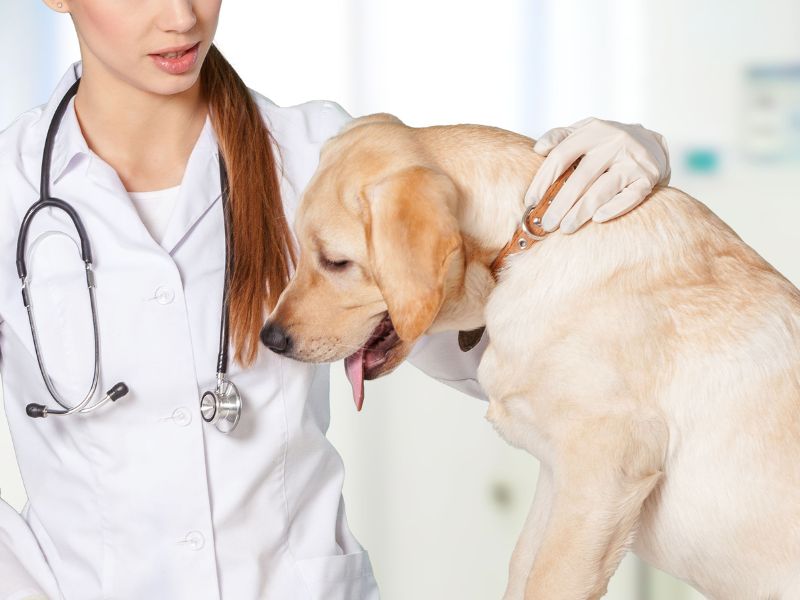Labrador Retrievers are one of the most popular dog breeds in the world. They are known for their friendly and outgoing personalities, as well as their intelligence and loyalty. However, like all dog breeds, Labradors are susceptible to certain health issues that owners should be aware of.
One of the most common health issues that Labradors face is hip dysplasia. This is a genetic condition that affects the hip joints, causing pain and difficulty walking. Another common issue is obesity, which can lead to a variety of health problems, including joint issues, heart disease, and diabetes. Other potential health issues include ear infections, allergies, and eye problems.
Despite these health concerns, with proper care and attention, Labradors can live long and healthy lives. Regular exercise, a healthy diet, and routine veterinary care are essential to keeping your Labrador in good health. By staying aware of potential health issues and taking preventative measures, you can help ensure that your furry friend stays happy and healthy for years to come.
Keeping Your Labrador Healthy
Labradors are generally healthy dogs, but there are some things you can do to keep them in tip-top condition. Here are some tips to help you keep your furry friend healthy:
- Regular exercise: Labradors are active dogs and need plenty of exercise to stay healthy. Take your dog for daily walks and play games like fetch to keep them active and engaged.
- Proper nutrition: A healthy diet is essential for your Labrador’s health. Make sure to feed them a balanced diet that is appropriate for their age and activity level. Avoid giving them too many treats or table scraps, as this can lead to obesity and other health problems.
- Regular vet check-ups: Regular check-ups with your veterinarian can help catch any health problems early on. Make sure to schedule annual check-ups for your Labrador and keep up with their vaccinations.
- Grooming: Regular grooming is important for your Labrador’s health. Brush their coat regularly to remove loose hair and prevent matting. Trim their nails regularly and clean their ears to prevent infections.
By following these tips, you can help keep your Labrador healthy and happy for years to come.
Are Labs Healthy Dogs?
Labrador Retrievers are generally healthy dogs with a life expectancy of 10 to 12 years. They are well-constructed dogs with strong, well-proportioned bodies, and they are known for their boundless energy and friendly nature. However, like all breeds, they are prone to certain health issues.
One of the most common health issues in Labs is obesity. Labs love to eat, and they will often overeat if given the chance. Obesity can lead to a variety of health problems, including joint problems, heart disease, and diabetes. It is important to monitor a Lab’s eating habits and make sure they are getting enough exercise to maintain a healthy weight.
Labs are also prone to certain joint conditions, such as hip dysplasia and elbow dysplasia. These conditions are strongly genetic in origin, but the exact genes that cause the problems have not been identified. Regular exercise and a healthy diet can help prevent joint problems, but it is important to have a Lab’s joints checked regularly by a veterinarian.
In conclusion, while Labrador Retrievers are generally healthy dogs, they are prone to certain health issues. With proper care, including a healthy diet, regular exercise, and regular veterinary check-ups, Labs can live long, healthy lives.
What To Do When Your Labrador Is Sick
When a Labrador is sick, it can be distressing for both the dog and their owner. It’s important to take action promptly to ensure the best possible outcome for your furry friend. Here are some steps to take when your Labrador is sick.
Step 1: Observe Symptoms
The first step is to observe your Labrador’s symptoms. This can help you determine the severity of the illness and whether it requires immediate attention from a veterinarian. Symptoms to look out for include vomiting, diarrhea, lethargy, loss of appetite, and difficulty breathing.
Step 2: Contact Your Veterinarian
If your Labrador is displaying any concerning symptoms, it’s important to contact your veterinarian. They can advise you on the best course of action and may recommend bringing your dog in for an examination. It’s important not to delay seeking veterinary care when your dog is sick.
Step 3: Follow Your Veterinarian’s Advice
Your veterinarian will provide you with advice on how to care for your sick Labrador. This may include medication, dietary changes, or other treatments. It’s important to follow their advice closely to ensure your dog makes a full recovery.
Step 4: Monitor Your Labrador’s Progress
Keep a close eye on your Labrador’s progress as they recover from their illness. Monitor their symptoms, appetite, and energy levels. If you notice any changes or concerns, contact your veterinarian immediately.
Taking these steps can help ensure your Labrador receives the care they need when they are sick. Remember to always seek veterinary care promptly and follow your veterinarian’s advice closely.
When To Call The Vet
Labradors are generally healthy dogs, but like all living creatures, they can fall ill or get injured. It’s essential to know when to call the vet to ensure your furry friend receives prompt medical attention. Here are some situations where you should call the vet:
1. Sudden Behavioral Changes
If your Labrador exhibits sudden behavioral changes, such as lethargy, aggression, or excessive vocalization, it could be a sign of an underlying medical condition. In such cases, it’s best to call the vet and have your furry friend examined.
2. Digestive Issues
Digestive issues such as vomiting, diarrhea, and constipation are common in dogs, but they can be a sign of an underlying medical condition. If your Labrador experiences any of these symptoms, it’s best to call the vet and seek medical attention.
3. Breathing Difficulties
If your Labrador experiences breathing difficulties, such as wheezing, coughing, or panting excessively, it could be a sign of an underlying respiratory condition. In such cases, it’s best to call the vet and seek medical attention.
4. Injury
If your Labrador sustains an injury, such as a broken bone, open wound, or severe bleeding, it’s essential to seek medical attention immediately. In such cases, it’s best to call the vet and follow their instructions.
5. Unusual Symptoms
If your Labrador exhibits any unusual symptoms, such as seizures, loss of appetite, or sudden weight loss, it’s best to call the vet and have your furry friend examined. Unusual symptoms could be a sign of an underlying medical condition that requires prompt medical attention.
Remember, it’s always better to be safe than sorry when it comes to your furry friend’s health. If you’re unsure whether your Labrador needs medical attention, it’s best to call the vet and seek their advice.
Normal For Puppies
Labrador puppies are born with closed eyes and ears, and they are unable to walk. They rely on their mother for warmth, milk, and protection. The first few weeks of their life are crucial for their development, and it is important to provide them with a safe and comfortable environment.
As they grow, their eyes and ears will open, and they will start to explore their surroundings. Puppies will also start to develop their teeth, and this is when they will start to chew on anything they can get their paws on. It is important to provide them with appropriate chew toys to prevent them from damaging household items.
Labrador puppies are also known for their love of food and can be prone to overeating. It is important to monitor their food intake and provide them with a balanced diet to ensure they grow up healthy and strong. A table of recommended daily food intake based on weight can be found below:
| Weight | Daily Food Intake |
|---|---|
| 5-10lbs | 1/2 – 1 cup |
| 10-25lbs | 1 – 2 cups |
| 25-50lbs | 2 – 3 cups |
| 50-75lbs | 3 – 4 cups |
| 75-100lbs | 4 – 5 cups |
In addition to providing them with a balanced diet, it is important to socialize puppies from a young age. This means exposing them to different people, animals, and environments to help them develop into well-adjusted adults. It is also important to start training them early to prevent bad habits from forming.
Overall, Labrador puppies require a lot of care and attention, but with the right environment and care, they will grow up to be happy and healthy dogs.
Not Normal For Puppies
Labrador puppies are known for their playful nature and high energy levels. However, there are some signs that are not normal for puppies and should be taken seriously.
Lethargy
If a Labrador puppy is unusually lethargic, it could be a sign of a serious health issue. Puppies are naturally energetic and playful, so if a puppy is not showing any interest in playing or seems overly tired, it could be a sign of an underlying health condition. Owners should monitor their puppy’s behavior and take them to the vet if they notice any significant changes.
Loss of Appetite
Labrador puppies are known for their love of food, so if a puppy suddenly loses their appetite, it could be a sign of a health problem. Loss of appetite can be caused by a variety of factors, including illness, stress, or changes in the puppy’s environment. If a puppy refuses to eat for more than a day or two, it is important to take them to the vet.
Diarrhea
Diarrhea is a common problem for puppies, but it can also be a sign of a more serious health issue. If a puppy has diarrhea that lasts for more than a day or two, it could be a sign of an infection or other health problem. Owners should monitor their puppy’s bowel movements and take them to the vet if they notice any significant changes.
Vomiting
Vomiting is another symptom that can indicate a health problem in puppies. While occasional vomiting is normal for puppies, frequent or persistent vomiting can be a sign of an underlying health issue. If a puppy is vomiting frequently or seems to be in distress, it is important to take them to the vet as soon as possible.
In summary, owners should be aware of their Labrador puppy’s behavior and take note of any changes. If a puppy seems lethargic, loses their appetite, has diarrhea, or is vomiting frequently, it is important to take them to the vet to rule out any underlying health problems.
Puppies Under Eight Weeks Old
Labrador puppies under eight weeks old require special attention and care to ensure they grow up healthy and strong. During this time, they are still developing their immune systems and learning how to interact with their environment.
One of the most important things to keep in mind when caring for a Labrador puppy under eight weeks old is their feeding schedule. According to a guide to Labrador puppy schedules, puppies at this age should be fed four to six small meals a day. This ensures they receive the proper nutrition they need to grow and develop.
In addition to feeding, it is important to provide a safe and comfortable environment for the puppy. This can include a designated area for sleeping and playing, as well as plenty of toys and chew items to help with teething.
Socialization is also crucial during this time. Puppies should be introduced to new people, animals, and environments to help them develop into well-adjusted adults. However, it is important to be cautious and avoid exposing them to potential sources of illness such as unvaccinated dogs or crowded areas.
Overall, caring for a Labrador puppy under eight weeks old requires patience, attention, and a willingness to adapt to their changing needs. With proper care and attention, they will grow up to be happy and healthy adult dogs.
More Information
For more information on Labrador health, owners can consult with their veterinarian or refer to reputable online resources such as the American Kennel Club or PetMD. These resources provide valuable information on topics such as nutrition, exercise, and common health issues.
It is also important for owners to stay up-to-date on their Labrador’s vaccinations and regular check-ups. Regular exercise and a healthy diet can help prevent obesity, a common health issue in the breed.
Owners should be aware of the potential health issues that can affect Labradors, such as hip dysplasia, osteochondritis dissecans, and exercise-induced collapse. Reputable breeders will have their dogs DNA-tested for genetic diseases and will provide health clearances for their breeding dogs.
By staying informed and taking preventative measures, owners can help ensure the health and well-being of their beloved Labradors.
My Vet Isn’t Helping
Sometimes, pet owners may find themselves dissatisfied with their vet’s diagnosis or prescription. In such cases, it’s important to communicate with the vet and express any concerns or questions. However, if the issue persists, it may be time to seek a second opinion.
When seeking a second opinion, it’s important to provide the new vet with all relevant information about the dog’s health history, including any previous diagnoses, treatments, and medications. This can help ensure that the new vet has a complete picture of the dog’s health and can make an accurate diagnosis.
Another option is to seek advice from online resources or forums. However, it’s important to be cautious when relying on online advice, as not all sources may be reliable or accurate. It’s always best to consult with a qualified veterinarian for any health-related concerns.
In some cases, the issue may be related to a lack of communication between the pet owner and the vet. It’s important to ask questions and express any concerns or doubts, as this can help ensure that both parties are on the same page and working towards the best possible outcome for the dog’s health.














